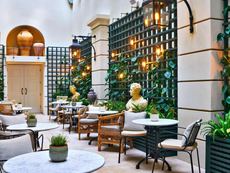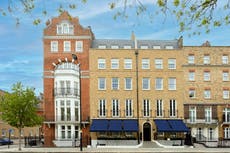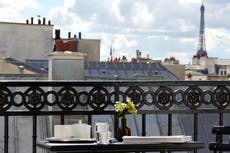Senegal's top surfer wants a fighting chance to compete at the Olympics
In four months, the world’s best athletes will be at the Paris Olympics
Your support helps us to tell the story
From reproductive rights to climate change to Big Tech, The Independent is on the ground when the story is developing. Whether it's investigating the financials of Elon Musk's pro-Trump PAC or producing our latest documentary, 'The A Word', which shines a light on the American women fighting for reproductive rights, we know how important it is to parse out the facts from the messaging.
At such a critical moment in US history, we need reporters on the ground. Your donation allows us to keep sending journalists to speak to both sides of the story.
The Independent is trusted by Americans across the entire political spectrum. And unlike many other quality news outlets, we choose not to lock Americans out of our reporting and analysis with paywalls. We believe quality journalism should be available to everyone, paid for by those who can afford it.
Your support makes all the difference.Cherif Fall kissed his wife on the lips and they swapped pecks on each other's foreheads, for good luck. Then he zipped up his wetsuit, grabbed his surfboard and strode into water he didn't want to be in.
Instead of training in the waves off his Senegal homeland, Fall was wistfully preferring to be in Puerto Rico, where the last surfing qualifying competition for the Paris Olympics ends on Saturday.
Senegal had nobody there to try and claim the last 14 spots for men and women.
“It's sad, I want it so bad ... I just need to believe in (myself) and believe in the people supporting me,” Fall says.
These will be the second Olympics to include surfers. Only 48 men and women will earn the right to compete in Tahiti, the French Polynesian island in the South Pacific. Surfers can qualify either by ranking highly enough or getting top spots in certain competitions, like the one in Puerto Rico, but none are easy avenues for Senegalese surfers.
Senegal is on the westernmost tip of Africa on the Atlantic Ocean, and surfing is part of daily life for many, with easy access to good waves including in the capital, Dakar. Yet, once athletes reach a certain level it's hard to go further. Travel to compete abroad is expensive, visas can be hard to secure, and there is little government investment, say those in the sport.
Fall began surfing when he was nine, borrowing a bodyboard from his father, who was a swim teacher. The family struggled financially. At times they couldn't afford to send him to school and he didn’t always have money to buy surfboards, often having to share with friends. Still, he was a natural, winning local competitions and promising himself that he'd make it to the Olympics one day.
It took 14 years and the help of his wife Nicole Sweet, a professional photographer who published photos of Fall on Instagram, for him to get sponsored by Billabong, one of the world’s leading surf brands. Wiping tears from his cheeks, he remembers the day he got the email. “I didn't know that one day I can be how I am right now," he says. "I remember when my Dad didn't have money ... it was really hard."
But even with financial backing from a huge sponsor, the 27-year-old Fall still can't afford proper coaching and doesn't enter enough competitions to earn points to help his global ranking.
Surfers and coaches in Senegal say the athletes have immense potential but the sport needs more investment for training facilities, equipment and coaching. To compete on the world stage, the surfers say they need the basics such as a daily training environment with a knowledgeable coach and quality equipment.
"It's like trying to swim and you have a pool with no water,” says Molly Killingbeck, an Olympic silver medalist in track and a performance adviser for athletes trying to make it to the Paris Games.
Bodies like the International Surfing Association need to advocate for quality competitions in all regions of the world to allow the best athletes the opportunity to compete at major international events, Killingbeck adds.
The surfing association did not respond to requests for comments.
Senegal's government did pay to send surfers to Olympic qualifiers in the United States, where they reached the quarterfinals, and El Salvador, where they were were knocked out in the first round. The Senegalese Surfing Federation says it would have cost approximately $30,000 to send six surfers and three coaches to the qualifier in Puerto Rico.
The sports ministry didn’t respond to requests by The Associated Press for comment.
Alexandre Alcantara, president of the Senegalese Surfing Federation, says the government is invested in more popular sports such as soccer, wrestling and basketball, and is focused on the Youth Olympic Games, which the country is hosting in 2026. He says changes in the sports ministry and Senegal's tense political climate are likely reasons why there was less interest this year.
Senegal has been thrown into turmoil as elections meant for February were controversially delayed by the president, sparking deadly protests. Elections have been proposed for June but it's unclear when the president, whose term ends in April, will step down.
Still, Alcantara says that even if Senegal sent surfers to Puerto Rico it wouldn’t have made a difference. “There is very (little) room for people to qualify and we would not have (had) a chance,” he says.
In an attempt to get surfers on the continent more visibility, for the first time the African Surfing Federation is launching a surf tour.
Starting in April, there will be six competitions beginning in Ghana and ending in Senegal in December. Other countries slated to host events are Liberia, Nigeria, South Africa and Madagascar.
Oumar Seye, the African Surfing Federation president who's spearheading the initiative, says it’s a chance for athletes to make money, find sponsors, and get valuable ranking points. He adds sponsors in Europe and Africa have expressed interest in funding the event.
As they wait for change, Senegal's surfers say they won't give up. “I don’t know how many years it will take,” Fall says, "but one day I will get there.”
___
Associated Press writer Babacar Dione contributed.
___
AP Olympics: https://apnews.com/hub/2024-paris-olympic-games


